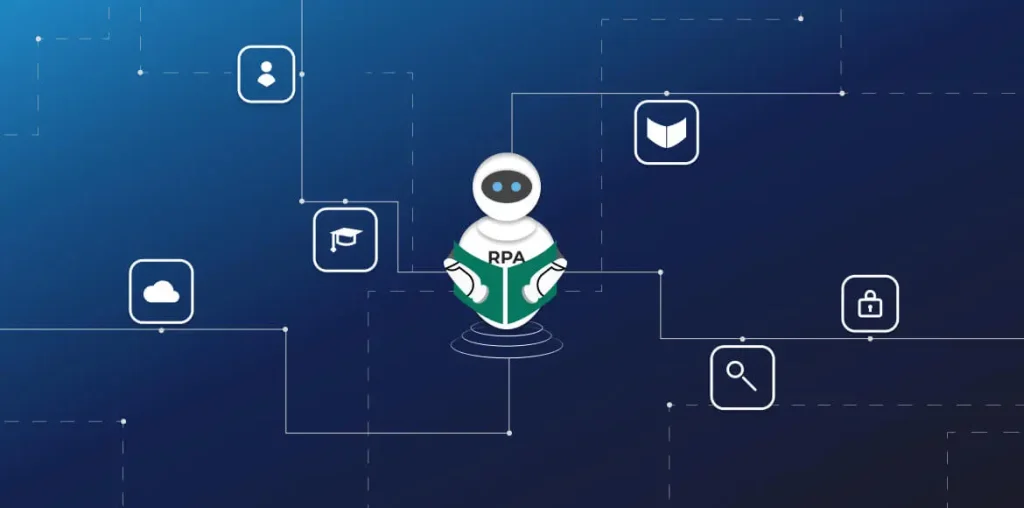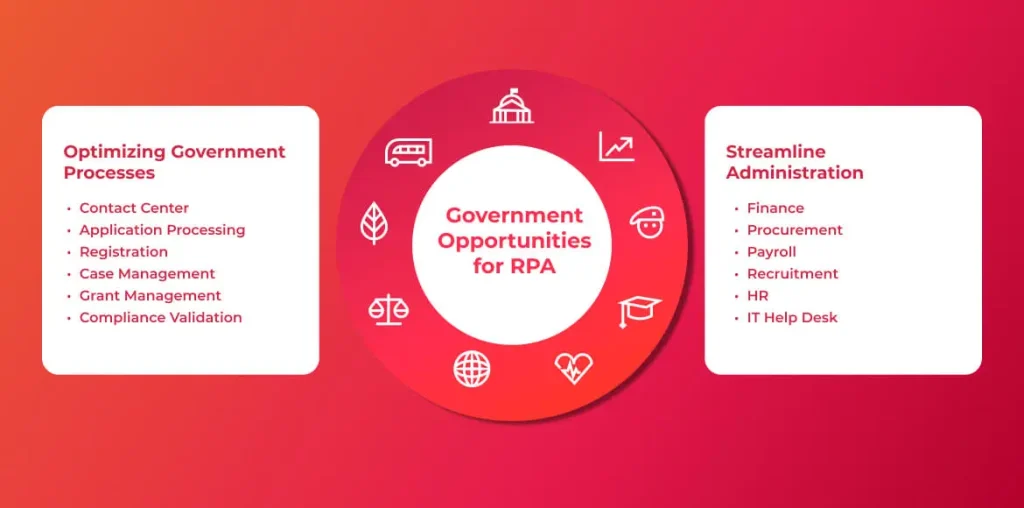The purpose of this article is to delve into the less-discussed facet of RPA – its profound potential to drive positive social change in communities. Far beyond the confines of profit margins and productivity metrics, RPA holds the promise of democratizing access to essential services, streamlining educational and healthcare systems, and even addressing pressing environmental issues. In an era where 45% of work activities globally can be automated using existing technology, as McKinsey Global Institute reports, the implications of RPA in societal contexts become not just intriguing but imperative to explore.
As we unpack the layers of RPA's societal impact, we'll discover how this technology is not only a harbinger of digital transformation in the corporate world but also a beacon of hope and progress in our communities. Join us on this insightful journey into the heart of RPA's role in shaping a more efficient, inclusive, and sustainable future.
Understanding RPA: A Tool for Positive Social Change
RPA's power in driving social change lies in its ability to liberate human resources from tedious tasks, allowing a focus on more strategic, creative, and impactful work. This shift not only boosts productivity but also enriches job roles, leading to more fulfilling work experiences. According to a report by Deloitte, RPA can lead to a 65% reduction in labor-intensive projects, thus freeing up human talent for more meaningful and innovative tasks.
In terms of scalability and adaptability, RPA proves to be a versatile ally in various social sectors. For example, in education, automating administrative tasks can lead to more efficient operations, allowing educators to focus more on teaching and less on paperwork. A study published in the Journal of Educational Technology & Society highlights how automation can significantly reduce the administrative burden in educational settings, enhancing the overall learning environment.
Moreover, in healthcare, RPA can streamline patient data management and appointment scheduling, as detailed in an article from the Healthcare Information and Management Systems Society (HIMSS). This optimization leads to better patient care and improved healthcare delivery.
These examples underscore how RPA transcends its technological framework, becoming a tool for societal enrichment. By bridging gaps and creating new opportunities, RPA is reshaping the landscape of social good. For more insights into RPA's impact on society, readers can explore the extensive resources available at the Institute for Robotic Process Automation & Artificial Intelligence (IRPA AI).
As we explore RPA's applications in education, healthcare, and community services, we see that its significance lies not just in technological advancement but in its capacity to enhance human lives and strengthen communities. RPA, thus, emerges not only as a business tool but as a beacon of social innovation.
Empowering Underrepresented Groups
RPA offers a unique opportunity to empower underrepresented groups by automating routine tasks, opening the door to more skilled and fulfilling job opportunities. It democratizes access to employment in technology sectors, providing a pathway for diverse talents to engage in the digital economy.
For instance, RPA can be instrumental in initiatives that focus on upskilling women in tech, as seen in programs like Women Who Code. By reducing barriers to entry and fostering an inclusive workforce, RPA plays a pivotal role in driving diversity and inclusion in the workplace.
RPA in Education: Democratizing Learning Opportunities
RPA's versatility and potential for societal good are exemplified by its positive impact on the education sector. RPA achieves this by automating repetitive and administrative tasks, paving the way for a more focused and efficient education system. Schools, with their paperwork and routine tasks, can use RPA to make tasks like enrolment, tracking attendance, and grading more efficient which in turn frees up educators' time for teaching and engaging with students.
One of the significant advantages of utilizing RPA in schooling is that it can level the playing field for learning opportunities. By using RPA to manage time-consuming administrative tasks, educational institutions can devote more resources to improve student learning experiences and broaden access to education. This is especially important in schools with limited resources, where administrative overheads often impede educational innovation and customized learning.
Moreover, RPA can be instrumental in personalized education. By using RPA tools to automate data analysis, teachers can adapt their teaching methods to meet the unique requirements of each student. This not only enhances academic results but also creates a welcoming space where all learners' needs are catered to.
The influence of RPA on education is not limited to administrative functions. It also offers the chance to familiarise students with the world of automation and technology. Introducing RPA into the curriculum enables students to gain an early acquaintance with these technologies, which bestows upon them the aptitude and expertise to prosper in a swiftly changing digital realm.
Although no study from the Journal of Educational Technology & Society specifically highlights the impact of RPA on administrative tasks within education, the increasing trend of integrating technology in education indicates that tools such as RPA are being accepted and implemented to enhance education.

This advancement of RPA in education isn't only about efficacy; it aims to shape a future where education is more reachable, customized, and synchronized with the requisites of the digital epoch.
Enhancing Healthcare Access with RPA
In the healthcare sector, Robotic Process Automation (RPA) is emerging as a crucial tool for enhancing patient care and operational efficiency. The application of RPA in healthcare goes beyond mere administrative convenience; it directly contributes to improved patient experiences and the overall quality of healthcare services.
One of the key areas where RPA is making a significant difference is in patient data management. By automating the handling of patient records, appointment scheduling, and billing processes, RPA reduces the likelihood of human error, ensures compliance with healthcare regulations, and speeds up patient service delivery. This automation not only streamlines administrative tasks but also allows healthcare professionals to focus more on patient care rather than paperwork. A white paper from HIMSS, titled "Robotic Process Automation: Changing the Way We Work", elaborates on how RPA is transforming these aspects of healthcare .
Moreover, RPA's impact extends to handling prescription management and aiding in diagnostic processes. By integrating RPA with healthcare systems, hospitals and clinics can ensure more accurate and timely medication management, reducing risks and enhancing patient safety. In diagnostics, RPA can assist in the preliminary analysis of diagnostic tests, speeding up the process and aiding healthcare providers in making quicker and more informed decisions.
RPA is also playing a pivotal role in addressing healthcare accessibility challenges. In regions with limited healthcare resources, RPA can compensate for staffing shortages by automating routine tasks, thereby expanding the reach and availability of healthcare services. This benefit is particularly valuable in remote or underserved communities, where access to quality healthcare is often a major concern.

RPA in municipal services: A path to efficiency and inclusivity
RPA is transforming local government services, offering new opportunities for efficiency and inclusivity. In public service sectors, where resources are often limited and demand for services is high, RPA is a powerful tool for improving service delivery and accessibility. By automating routine tasks, RPA enables community service providers to focus on more critical aspects of their work, such as direct engagement with people in need and programme development.
One of the key areas where RPA can have a significant impact is in the processing of welfare claims. Automating the processing and verification of these applications not only speeds up the delivery of services, but also minimises errors. This efficiency is critical to ensuring that aid gets to the right people quickly, especially in times of crisis or emergency when rapid response is critical.
In addition, RPA can play an important role in data management within municipal services. By efficiently handling large volumes of data, RPA tools can help to better track service outcomes, monitor community needs and plan future initiatives. This data-driven approach enables community services organisations to make informed decisions, allocate resources more effectively and tailor services to meet specific community needs.
Another important aspect of RPA in community services is its contribution to inclusivity. By streamlining processes and making services more accessible online, RPA helps to reduce the barriers that people with disabilities or living in remote areas may face in accessing services. This technological intervention ensures that more people can benefit from essential services, regardless of their physical or geographical limitations.

Addressing Environmental Challenges with RPA
One significant area where RPA is making a difference is in the collection and analysis of environmental data. Automated systems can gather vast amounts of data from various sources, such as sensors and satellites, to monitor environmental conditions like air and water quality. This capability allows for real-time tracking of environmental changes, enabling quicker responses to potential issues such as pollution or habitat destruction.
RPA also plays a vital role in streamlining compliance and reporting processes for environmental regulations. Companies can use RPA tools to automatically compile and submit required environmental data to regulatory bodies, ensuring compliance and reducing the administrative burden. This automation not only saves time but also minimizes the risk of errors in reporting, contributing to more effective environmental governance.
Furthermore, RPA can assist in sustainable resource management. For instance, in the agricultural sector, RPA can optimize irrigation and fertilization schedules based on data analytics, leading to more sustainable use of water and other resources. This technology can significantly contribute to reducing the environmental footprint of various industries, promoting more sustainable practices.
Overcoming Challenges: Ethics, Accessibility, and Education
Overcoming Challenges: Ethics, Accessibility, and Education
The use of RPA is changing many different industries and tackling the challenges of its widespread adoption is vital, especially when it comes to ethics, accessibility, and education.
Ethical Concerns:
Integrating
RPA into businesses brings up significant ethical issues, specifically affecting data privacy and job displacement. It's crucial that companies implementing RPA technology stick to strict data protection regulations to keep confidential data safe. Moreover, the effect of automation on employment underlines the need for careful planning to manage skill-building and transitions. Ethical use of RPA must put transparency, equity, and the interests of all parties first.
Accessibility limitations:
Accessibility is a crucial issue, especially in making sure that RPA technologies are available and helpful to all parts of society. This involves tackling the digital gap, where disadvantaged communities may not have the infrastructure or resources to utilise these technologies. To guarantee that RPA is obtainable to those who need efficiency and resource optimisation the most, we must concentrate on democratising access to RPA.
Educational initiatives:
Education is essential for the successful application of RPA. With the increasing requirement for programmes aimed at providing the current and future workforce with necessary skills to work with or even develop RPA technologies, broader comprehension of the consequences of automation across different sectors is a must, in addition to technical training.
Bottom line
As we have explored, Robotic Process Automation (RPA) is moving far beyond its initial business applications to become a transformative force for social good. From improving education and healthcare to revolutionising community services and environmental management, RPA is demonstrating its versatility and potential to drive significant social change. RPA's journey into different aspects of society reveals its capacity not just as a technological tool, but as an enabler of efficiency, inclusivity and innovation. By automating mundane tasks, RPA enables a greater focus on human-centred services and creative problem solving.It offers a way to democratise access to essential services and ensure that the benefits of technological advances are shared more widely.
However, the integration of RPA also presents challenges, particularly in the areas of ethics, accessibility and education.Addressing these challenges is critical to ensuring the equitable and responsible growth of RPA technologies. By focusing on ethical practices, improving accessibility, and investing in education and training, we can harness the full potential of RPA for the greater good.
Looking ahead, the role of RPA in social innovation will only increase. As we prepare for a future driven by digital technologies, RPA stands as a beacon of progress, offering new ways to address social challenges and improve quality of life. The journey of RPA is not just about automation; it's about creating a future where technology serves humanity, fostering a world that is more efficient, equitable and sustainable. In conclusion, the transformative journey of RPA in society is a testament to the limitless possibilities of technology when aligned with human values and needs. By embracing these advances, we are paving the way for a more innovative, inclusive and sustainable future.
For more insights into the transformative power of RPA and its applications across different sectors, we invite you to visit the Scimus website and explore our Scimus blog. Discover how our expertise in bespoke software solutions can help drive efficiency and innovation in your business.

